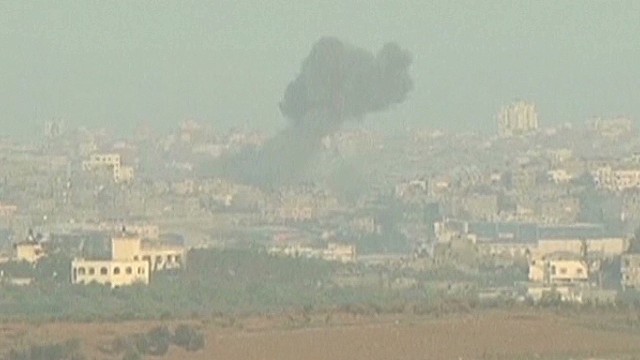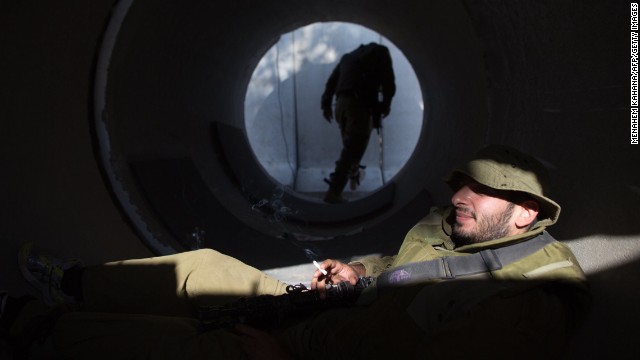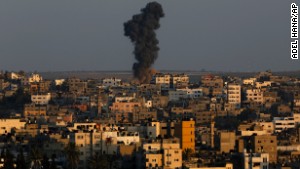3 senior Hamas military leaders killed in Israeli airstrike on Gaza
August 22, 2014 -- Updated 0324 GMT (1124 HKT)
 |
3 Hamas leaders killed by Israeli strikes |
The three members of the
Brigades' 15-member military council were killed in a bombing in Rafah
in southern Gaza, according to Hamas.
The announcement of their
deaths comes the day after Hamas said an Israeli strike had killed the
wife and at least two children of Mohammed Deif, the head of the
military wing. Deif's 7-month-old son was killed, and the body of one of
his daughters was removed from the rubble later, according to Hamas.
Another of Deif's daughters is missing and believed to be buried in the
rubble. The strike failed to kill Deif, Hamas said.
.
Role in capture of Israeli soldier
 |
| Photos: Israel-Gaza crisis |

Hamas: We're aiming for Tel Aviv airport
The militant group, which
controls Gaza, said the leaders killed overnight were Mohammed Abu
Shamala, Raed al-Attar and Mohammed Barhoum.
A crater the size of a residential block was left at the site of the airstrike.
According to Palestinian officials, Israeli airstrikes have killed 27 since midnight local time (5 p.m. ET Wednesday).
Hamas vowed revenge for their deaths.
"The assassination of the
Qassam leaders is a great Israeli crime that will not succeed in
breaking the will of our people or even weaken the resistance, and
Israel will pay the price," spokesman Sami Abu Zuhri said.
Al-Attar, the commander of the Qassam Brigades in Rafah, is believed to be the most senior of the three.
The Israeli military
said it had confirmed that it killed the three men. It described
al-Attar and Abu Shamala as "high-ranking Hamas commanders responsible
for major terror attacks against Israelis."
Al-Attar played a "major
role" in the capture of Israeli soldier Gilad Shalit in 2006, the
Israel Defense Forces said on its Twitter account. Shalit was held
captive until a deal was struck for his release in 2011 in exchange for
more than 1,000 Palestinian prisoners.
"This morning's strike
sends a clear message to those responsible for planning attacks," IDF
spokesman Lt. Col. Peter Lerner said in a statement. "We will strike
those that have terrorized our communities, towns and cities, we will
pursue the perpetrators of abduction of our soldiers and teenagers, and
we will succeed in restoring security to the State of Israel."
Renewed fighting
The return to violence
between Israel and Hamas began Tuesday after a cease-fire and peace
talks in Cairo fell apart, with each side blaming the other for the
breakdown.
The Egyptian-brokered
negotiations were aimed at finding a lasting end to the current Gaza
conflict, which has killed more than 2,000 Palestinians, around 70% of
them civilians, according to the United Nations. The fighting, which
erupted in early July, has killed 67 people on the Israeli side, most of
them soldiers.
But the two sides failed
to reach a compromise, with Israel calling for Gaza to be demilitarized
and Hamas requesting, among other things, the lifting of Israel's
economic blockade on Gaza.
Humanitarian groups have
warned of a dire situation in Gaza, where tens of thousands of people
have been left homeless amid the destruction caused by the conflict.
The Israeli military
said Thursday that more than 225 rockets have been fired at Israel from
Gaza since the truce collapsed this week. Over the same period, Israeli
forces have attacked around 150 targets in Gaza, the IDF said.
One airstrike Thursday
hit a cemetery in Gaza City, where a group of people were digging a
grave for relatives, Palestinian health officials said. The attack
killed six people and injured others, paramedics told the Hamas-run Al
Aqsa TV.
Hamas threatens airport
"Our policy is simple:
If you shoot, you will get attacked," Israeli Prime Minister Benjamin
Netanyahu said Wednesday. "If you try more, you will get double."
Israel will not stop its
efforts against Hamas "until we can ensure full safety and security"
for people in Israel's south, the prime minister said.
The Qassam Brigades on
Wednesday warned international airlines to refrain from landing at or
taking off from Ben Gurion Airport in the Israeli city of Tel Aviv from
Thursday morning onward.
U.S. aviation
authorities briefly banned U.S. carriers from flying to and from the
airport in late July after a Hamas rocket struck nearby. Many
international airlines followed suit, canceling flights to and from Tel
Aviv.
But flights picked up
again after the U.S. Federal Aviation Administration lifted the ban.
Israeli officials, including Netanyahu, had lobbied Washington to
reverse the extraordinary order.
Talal Abu Rahma reported from Gaza, and
Jethro Mullen reported and wrote from Hong Kong. CNN's Samira Said
contributed to this report.

No comments:
Post a Comment